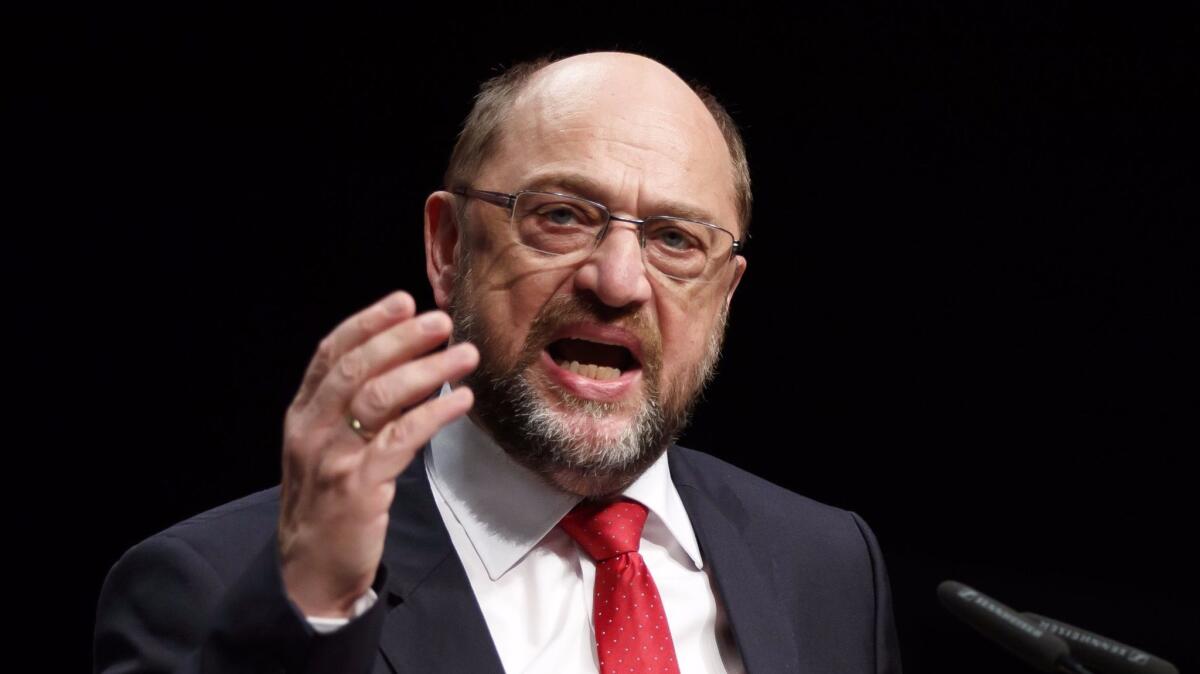An awkward partnership might be the solution to Germany’s political stalemate

- Share via
After an inconclusive fall election threatened to paralyze Germany’s leadership, the renewal of an uncomfortable right-left partnership could herald an end to what analysts had been calling the country’s worst post-war political crisis.
The center-left Social Democrats abruptly said Friday that they are open to forming a coalition government with Chancellor Angela Merkel’s conservative party.
The Social Democrats, or SPD, had reluctantly joined forces to support the conservatives to form a majority in parliament during eight of the last 12 years. Then this fall the SPD steadfastly refused to supply the needed backing for another four years under Merkel after suffering another drubbing, its worst result in 70 years, in the national elections on Sept. 24.
But the pressure on the SPD and its beleaguered chairman, Martin Schulz, to abandon that firm “Nein” grew inexorably this week after Merkel’s efforts to forge an unwieldy three-way coalition with two other smaller parties collapsed acrimoniously Sunday.
Merkel’s failure to find a willing coalition partner raised fears of political turmoil in a country that desperately craves stability.
Germany’s European Union partners watched in horror as Merkel’s power and political career appeared to be eroding in recent weeks at the worst possible moment, when the bloc was increasingly dependent on her sure-handed leadership in the face of Brexit negotiations with Britain over its exit from the EU, the euro zone debt crisis and growing trans-Atlantic tensions following President Trump‘s election.
With her grip on power at home ominously slipping away and doubts about her future spreading to capitals across Europe, the 63-year-old veteran chancellor got the unexpected last-ditch reprieve Friday thanks to the heavy-handed intervention of Germany’s figurehead president, Frank-Walter Steinmeier.
Despite his limited powers as the titular head of state, Steinmeier has been twisting arms behind the scenes all week in a desperate bid to find a way to avoid the time-consuming and destructive process of new elections that would not likely take place until April. Such a delay would have prolonged the period of uncertainty at a time when the European Union and Germany, the EU’s largest member, can ill afford it.
Steinmeier, who was himself defeated by Merkel in their race for chancellor in 2009, managed to persuade his SPD party ally Schulz in a private hour-long meeting Thursday at his office in the Bellevue Palace in Berlin to rethink a hasty decision made right after the election results were announced on Sept. 24. Back then Schulz ruled out helping Merkel form a stable government for another four years.
The SPD, which suffered setbacks in the last three national elections, had grown tired of playing a thankless role as second fiddle in another Merkel government. Schulz spent eight long hours through Thursday night huddling with other SPD leaders after meeting Steinmeier — nearly three times as long as planned.
Schulz emerged from the closed-door SPD talks early Friday to announce that the party had decided, for the sake of “Germany’s national interests,” to explore the possibility of another “grand coalition” with Merkel’s conservatives even though it was not something his party wanted to do.
Attempting to save face after long refusing such a course, Schulz added that the party would nevertheless ask its 430,000 grass-roots members to vote to approve or reject any detailed coalition agreement that would be hammered out in the next month or two with Merkel’s conservatives.
“We don’t have a government crisis, but Germany is in a complicated situation,” Schulz said, tacitly referring to the country’s fear of minority governments or unstable coalitions after the turmoil of the Weimar Republic in the 1920s and 1930s made possible Hitler’s rise to power.
Merkel, who had been facing down calls from within her own party to resign after talks with the two other parties collapsed Sunday, did not comment directly on the SPD’s about-face. But as she spoke briefly to reporters in Brussels, Merkel’s broad smile spoke volumes; she appeared to be clearly relieved that the SPD had finally changed its mind — a move that most likely indirectly helped prolong her political career.
Merkel is not out of the woods yet, however, as the SPD is likely to demand a high price for another four years as her supporting cast. Even though the crisis appears to have been averted, the coalition talks could last until late January, analysts predict.
Kirschbaum is a special correspondent.
ALSO
At least 235 killed in Egypt after militants attack Sinai mosque
On the shadowlands of the frontier, a U.S. border agent plans his future in Mexico
Shocking sexual abuse allegations at a kindergarten in Beijing has China on edge
More to Read
Sign up for Essential California
The most important California stories and recommendations in your inbox every morning.
You may occasionally receive promotional content from the Los Angeles Times.













